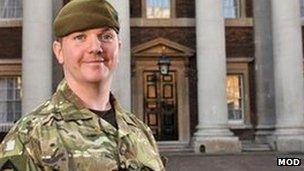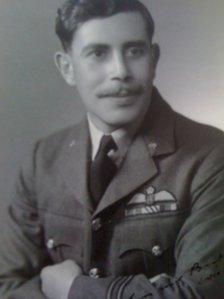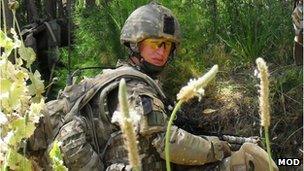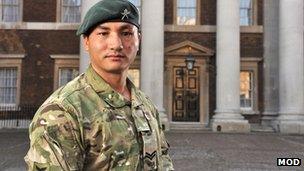Honours for defence personnel in Afghanistan and Libya
- Published
Service personnel who risked their lives to protect others during recent tours of duty in Afghanistan and Libya have been given military honours.
Royal Navy, Army, and Royal Air Force personnel were among 131 honoured for going above and beyond the call of duty between April and September 2011.
They include Cpl Carl Taylor, who saved three Afghan boys trapped by gunfire.
Meanwhile, Lt Cdr James Byron was rewarded for leading navy operations in Libyan waters during the Arab Spring.
Here the BBC details the exploits of just a few of those honoured.
Cpl Carl Taylor, 3rd Battalion The Mercian Regiment

Cpl Carl Taylor returned the children safely to their mothers.
A 25-year-old soldier, he has been awarded the Military Cross for rescuing three young Afghan children from insurgent gunfire.
Cpl Carl Taylor, whose girlfriend was pregnant at the time, ran 80ft (24m) over open ground to reach the boys in Popalzay, Helmand province.
Cpl Taylor, of 3rd Battalion The Mercian Regiment, used his body to shield the children - aged between three and seven - from the crossfire during the incident on 10 March 2011.
He was only a month into his tour of Afghanistan and on a joint operation with Afghan National Police when his patrol came under attack in Popalzay village. The soldiers took refuge in a compound where they found two upset women.
Cpl Taylor, from Birmingham, said: "Through the interpreter they told me their children were stuck outside. I stuck my head out to have a look.
"The children were stuck behind a small wall. They were too scared to move because of the incoming fire from the insurgents."
Cpl Taylor ran to pick up one of the scared boys before heading back with platoon commander Capt James Cook to rescue the others and return them to their mothers.
"It was just the right thing to do. There was a chance of them getting caught in the crossfire, which is nothing to do with them," he said.
His girlfriend, midwife Becky Gallimore, has since given birth to son Ollie.
Cpl Taylor said news of the award - in recognition of exemplary gallantry during active operations - had come as a "complete shock" and he was "really chuffed" to have received it.
Flt Lt Jonathan Arvind Singh, RAF
Flt Lt Jon Singh, 31, has been awarded the Distinguished Flying Cross after managing to land his Chinook helicopter safely in Afghanistan despite insurgent gunfire rendering it "almost unflyable".
He has followed in the footsteps of his late grandfather, Flying Officer David Bhore, who was given the same award in 1944 for flying reconnaissance missions for the Royal Indian Air Force during World War II.
Flt Lt Singh's helicopter was hit by several rounds of gunfire during a raid on a Taliban bomb factory in Helmand on 24 June last year.
The helicopter was surrounded by a dust cloud while shots were being fired at it - with one entering the cockpit just 2in (5cm) below his right foot.
"I heard a bang, which felt like it was very close to me. My immediate thought was a round had gone through the screen in front of me," said Flt Lt Singh, from Bristol.
"The obvious human reaction is pretty much utter fear, and an overwhelming desire to get out of that situation," he said.

Flt Lt Jonathan Singh's grandfather was given the same award
Although he was able to lift the helicopter into the air, he realised it would be difficult to keep it there as the control system had been severely damaged.
But with his co-pilot, he managed to use the control stick to manoeuvre the craft close to a patrol base and bring it down "relatively smoothly" in a field.
"I had to use both hands and all the strength in my arms to push forward to try and get some speed.
"Normally it is very easy to handle - a bit like driving a car with power steering - while this was a bit like hauling a bus with no power steering," he said.
Although his medal citation said Flt Lt Singh demonstrated "exceptional captaincy", he said it had been a matter of teamwork.
He said: "I wasn't there alone. I was very much part of a crew. We fight as a crew, we fly together as a crew, and we live together as a crew on deployment.
"It is a huge honour to accept any recognition on behalf of the crew and the support guys who fix the aircraft."
Sjt Deacon Cutterham, 1st Battalion The Rifles

Sjt Deacon Cutterham said he had a gut feeling something would happen that day.
Sjt Deacon Cutterham, 28, of 1st Battalion the Rifles, protected his comrades by picking up and throwing away a live Taliban grenade in Afghanistan.
He has been awarded the Conspicuous Gallantry Cross (CGC) - just one level down from the Victoria Cross.
The serjeant, from Bristol, had been promoted in the field that morning, following the death of his friend Colour Sjt Kevin Fortuna the previous day. He was on his first operation in command when the incident happened.
He said he was wary of an imminent insurgent attack as soon as he left his base in Nahr-e-Saraj, Helmand, on 24 May last year.
"You can sort of tell by the atmospherics in the air - you could cut the atmospherics with a knife. People who are normally sociable towards you don't want to talk to you," he said.
He and his patrol were wading through an irrigation ditch when the grenade was thrown at them over a high wall - landing just 7ft-10ft (2m-3m) in front of the eight men.
He said: "I heard the 'ching' of the fly-off lever coming off it. I just went into autopilot. I shouted 'get down, grenade', ran forward, grabbed it first time and just let go of it."
He threw it into another irrigation channel and said the explosion just a few seconds later was "unbelievable".
He added: "Looking back I realise how lucky I was. That if I hadn't picked it up with my first grab then it would have been game over. But I always trust my instincts. They've kept me safe on a number of occasions."
Sjt Cutterham's medal citation commends his "utterly courageous" action and "gritty leadership".
He was injured four months later, while still in Afghanistan, after falling from the roof of a compound under enemy attack. He hit his head but then regained consciousness two days afterwards while at Birmingham's Queen Elizabeth Hospital.
Air Engineer Mechanic Michelle Ping, Royal Naval Reserve
Aircraft Engineer Mechanic Michelle Ping, from Sheffield, was mentioned in dispatches for her bravery on 2 July 2011, during her first tour of Afghanistan last year.
The medical assistant, who also works for the Yorkshire Ambulance Service in Leeds, was a paramedic attached to various foot patrols.
"Wherever they went, I would go with them. Whatever trouble they got into, I was part of that as well," she said.
She was on a routine operation in Helmand when her patrol came under rapid fire.
"As soon as we landed we came under contact. A good six hours into the patrol we stopped at a compound to resupply. Some of the guys were on the roof providing covering fire but we pretty much got smashed for a couple of hours. They were chucking everything at us.
"Unfortunately one of my boys received a single gunshot wound to the left side of his head. We had a man down. Instinctively I got my kit and just ran up on the roof to look after him.
"That was my job. I didn't think about what I was doing, or the danger - the most important thing was looking after him - making sure he survived and we got him to safety.
"The Taliban were shooting at us, I remember looking at the splash marks and thinking, 'Ooh, that's a little bit close'. But we managed to get him out and he's doing well."
She said receiving the mention "was an honour" and her grandfather - who used to be in the navy - was very pleased with her.
She said her gender did not matter while she was out in Afghanistan.
"We want to be treated like one of the lads. We don't want to be protected or looked after. When you are living in that environment, there's no man or woman thing - you are just 'one of the boys'."
Cpl Baljit Limbu, The Royal Gurkha Rifles

Cpl Baljit Limbu was blinded just before he left Afghanistan
Cpl Baljit Limbu, 32, of The Royal Gurkha Rifles, was mentioned in dispatches after being injured while leading the rescue of a severely injured comrade in Afghanistan.
He was part of a three-man patrol who were thrown into the air by an explosion in June 2011. Cpl Limbu was showered with shrapnel and knocked unconscious.
"I woke up facing the opposite direction we had been patrolling in, and a long way away from when I had been stood. There was still a lot of smoke, so I couldn't see anything to start with, but then I saw the last man in the patrol lying just 5m (16ft) away from me."
Cpl Limbu ignored his own injuries to drag the badly wounded man to safety and give emergency first aid. He then led his group across flooded ground to the evacuation helicopter landing site.
As the helicopter came under fire, he turned around to tackle the insurgents so it could leave safely.
Only after the firefight was over did he reveal blast wounds to his arm and neck, and that he was suffering partial deafness.
"As the second in command my job is to make sure they are extracted, it's my duty no matter what happens, so my initial focus was the casualty.
"I don't fear running around out there, my only concern was how can I save my friends? If you think back now, then yes it is kind of scary, but it's not when you are there and your friend is lying down wounded," he said.
He was blinded in his left eye on his final day of his six-month tour of the country after insurgents fired at him from a checkpoint and is still being treated in Birmingham.
It means he has not seen his wife Bina and daughter Jianna, three, for nearly 18 months because they live at his army base in Brunei.
Lt Cdr James Byron, Royal Navy
Lt Cdr Byron was the commanding officer on HMS Brocklesby while it was based off Libyan shores between March and June last year.
He has received the Distinguished Service Cross for leading his team during a period of immense danger of unknown quantities.
He said his ship was tasked to go to Libyan waters after mining activity was spotted.
"We were called forward as the only minehunter at the time to go and prove the mining had happened and dispose of the mines.
"Effectively they had closed the port of Misrata where a humanitarian disaster was happening on shore.
"There were 16,000 people reported to be living in and around the port area who were being shelled day and night. By mining their approaches, they had stopped the flow of humanitarian aid coming in and refugees getting out. We had to clear the mines to open the port."
Not only were they looking for mines but were also in range of artillery missiles based on shore.
Lt Cdr Byron, of Barton-Upon-Humber, said they spent six days clearing mines to get the port open and then six weeks off the coast in danger of rocket attack.
"If we hadn't been able to open the port they would not have been able to airlift the medical supplies and food required to prevent the humanitarian disaster.
"By keeping Misrata viable and as a centre for the anti-regime forces to operate from, ultimately look where Libya is now - it was a success."
He said his award represented the work carried out to keep the port of Misrata open by all of his team. "I wear it with pride for every one of those 48 men and women who were under my command and who made a real difference."
WO1 Jonathan Lane, Army Air Corps
Warrant Officer First Class Jonathan Lane, of 656 Squadron, 4 Regiment Army Air Corps, has been mentioned in dispatches for a second time, for gallantry in Libya last year.
WO1 Lane, 37, braved a Libyan ground-to-air missile attack while front-seat aircraft commander in an Apache helicopter targeting an enemy command and control centre between Misrata and Zlitan.
As he began his attack run, he was targeted by the surface-to-air missile. But he identified its firing point before using his aircraft's flares to decoy the missile and return fire.
The father of one said: "It all happened really quickly, probably about five-to-six seconds, but as I saw the missile heading for us, I did think this could be it.
"Although I had come under small arms fire and anti-aircraft artillery attack before, this was the first time I had experienced a surface-to-air missile and, despite going through that scenario in a simulator, it was a real shock.
"The flare was deployed and I watched as the missile swerved at the last second. The adrenalin was pumping, my heart was thumping out of my chest.
"There was a sense of tremendous relief, followed by the realisation that it could happen again so we broke away from that zone but still had another aircraft engaging the target in that area."
He then chose to go back to try to stop a second attack.
He said: "It was very frightening. We had got away with it once. We did not know what else was there but knew the assets the enemy had access to.
"But because of the kit on the aircraft, we had been able to pinpoint the enemy position quickly after they fired on us. We found a rocket launcher which had been used to shoot at ships off the coast and destroyed it."
- Published6 December 2011
- Published25 March 2011
- Published30 April 2011